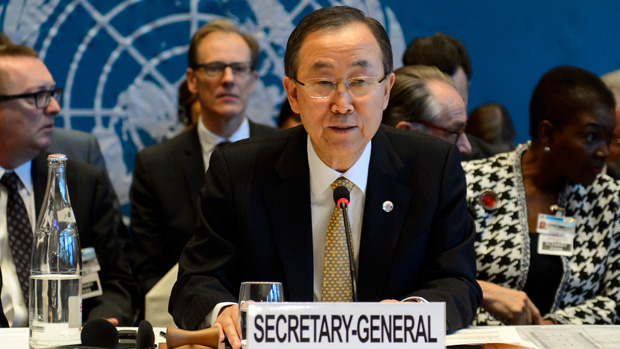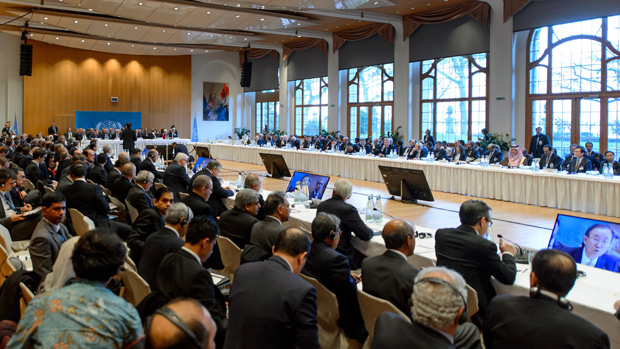Syria peace summit begins: can talks stop the bloody civil war?
Foreign ministers descend on Montreux despite 'near-zero' expectations of a political breakthrough

A free daily email with the biggest news stories of the day – and the best features from TheWeek.com
You are now subscribed
Your newsletter sign-up was successful
A MAJOR conference aimed at resolving the three-year conflict in Syria has kicked off today - but commentators are questioning how much it can really achieve.
Foreign ministers from around 40 countries, including the UK, US and Russia, have gathered in Montreux for a day of speeches before decamping to Geneva for two days of talks. The Syrian government and the main opposition group are both attending the summit, known as Geneva II.
The week got off to a shaky start when UN secretary general Ban Ki-moon, who is chairing the conference, was forced to withdraw a last-minute invitation to Iran after the Syrian opposition threatened to boycott the talks.
The Week
Escape your echo chamber. Get the facts behind the news, plus analysis from multiple perspectives.

Sign up for The Week's Free Newsletters
From our morning news briefing to a weekly Good News Newsletter, get the best of The Week delivered directly to your inbox.
From our morning news briefing to a weekly Good News Newsletter, get the best of The Week delivered directly to your inbox.
Yesterday the pressure on international leaders to find a humanitarian solution to the war increased as evidence of 'systemic killing' by government officials emerged. The evidence included 55,000 digital images of around 11,000 corpses, said to be those of detainees who had been tortured and murdered.

The Guardian's Ian Black says there are "near-zero expectations of a political breakthrough" at the summit, but there is slight hope of a deal on confidence-building measures and improved access for humanitarian aid on the ground to relieve the suffering of millions of ordinary people.
Black says prospects for progress depend on co-operation between the US and Russia.
The BBC's Paul Wood says that getting the Geneva process under way is seen by some as "an achievement in itself". In almost three years of civil war, there has never been a dialogue between the regime and the opposition.
A free daily email with the biggest news stories of the day – and the best features from TheWeek.com
But even if such a dialogue begins in Montreux, the opposition figures doing the talking do not, by and large, speak for the armed groups doing the fighting, says Wood. "There was, briefly, the tantalising prospect - held out by some American officials - that representatives of some key armed groups would attend. But that does not seem to have happened and it is a serious problem."
The key issue, says the BBC, is the future of President Bashar al-Assad - and it is an issue on which neither side appears willing to budge. The opposition wants to see him removed but Assad has repeatedly said he will not step down.
Compromise is "rendered impossible" by the fact that Assad is seen as essential to a peaceful outcome, the "butcher who remains indispensable until he can eventually be manoeuvred off the stage", says Roger Boyes in The Times.
"He will bombard and slaughter until the last minute. By dint of our failure to challenge Assad early on, to create safe zones to shield civilians from massacre, we have lost the will, or the ability, to stop this man," says Boyes. "In the meantime, Syria disintegrates."
-
 The ‘ravenous’ demand for Cornish minerals
The ‘ravenous’ demand for Cornish mineralsUnder the Radar Growing need for critical minerals to power tech has intensified ‘appetite’ for lithium, which could be a ‘huge boon’ for local economy
-
 Why are election experts taking Trump’s midterm threats seriously?
Why are election experts taking Trump’s midterm threats seriously?IN THE SPOTLIGHT As the president muses about polling place deployments and a centralized electoral system aimed at one-party control, lawmakers are taking this administration at its word
-
 ‘Restaurateurs have become millionaires’
‘Restaurateurs have become millionaires’Instant Opinion Opinion, comment and editorials of the day
-
 Epstein files topple law CEO, roil UK government
Epstein files topple law CEO, roil UK governmentSpeed Read Peter Mandelson, Britain’s former ambassador to the US, is caught up in the scandal
-
 Iran and US prepare to meet after skirmishes
Iran and US prepare to meet after skirmishesSpeed Read The incident comes amid heightened tensions in the Middle East
-
 Syria’s Kurds: abandoned by their US ally
Syria’s Kurds: abandoned by their US allyTalking Point Ahmed al-Sharaa’s lightning offensive against Syrian Kurdistan belies his promise to respect the country’s ethnic minorities
-
 Israel retrieves final hostage’s body from Gaza
Israel retrieves final hostage’s body from GazaSpeed Read The 24-year-old police officer was killed during the initial Hamas attack
-
 China’s Xi targets top general in growing purge
China’s Xi targets top general in growing purgeSpeed Read Zhang Youxia is being investigated over ‘grave violations’ of the law
-
 Syria’s Islamic State problem
Syria’s Islamic State problemIn The Spotlight Fragile security in prison camps leads to escape of IS fighters
-
 Panama and Canada are negotiating over a crucial copper mine
Panama and Canada are negotiating over a crucial copper mineIn the Spotlight Panama is set to make a final decision on the mine this summer
-
 Why Greenland’s natural resources are nearly impossible to mine
Why Greenland’s natural resources are nearly impossible to mineThe Explainer The country’s natural landscape makes the task extremely difficult